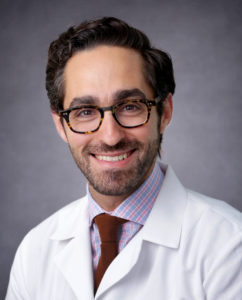
David D Shersher, MD
(CAMDEN, NJ) – Cooper University Health Care’s Center for Innovation has received a $100,000 grant from the Foundation for Health Advancement (FHA) to study and develop a new body cavity evacuator used to drain fluid from the pleural space of the lungs.
The novel device, invented and developed by Cooper thoracic surgeon David Shersher, MD, FACS, and Cooper pulmonologist Wissam Abouzgheib, MD, has the potential to provide a more effective, less invasive way to drain fluid from the body than current methods.
Addressing Pleural Empyema
Evacuators are devices used by physicians to remove fluids from different parts of the body following surgery or certain illnesses. The physicians developed the new device to address a condition called pleural effusion. Pleural effusion is fluid that collects in the pleural space, which is the space between the two layers of the pleura, the thin covering that protects and cushions the lungs.

Wissam Abouzgheib, MD
“One kind of pleural effusion is pleural empyema, which is a collection of pus in the pleural cavity caused by microorganisms, usually bacteria,” Dr. Abouzgheib explained. “Often pleural empyema happens in the context of pneumonia, injury, or chest surgery. Because of the thick nature of this fluid, it is often difficult to evacuate.”
Empyema affects more than 32,000 patients in the United States annually and is associated with elevated morbidity and mortality. According to Dr. Shersher, approximately 20% to 30% of patients affected will either die or require further surgery in the first year after developing empyema.
“Early intervention is crucial in the management of empyema by removing the pus from the pleural space to control or eliminate infection,” Dr. Shersher said.
How the Body Cavity Evacuator Works
Existing methods of removing fluid from body cavities are ineffective or, in the case of pleural empyema, overly cumbersome due to the viscous nature of the pus, requiring the simultaneous use of two separate entry points into the body. Multiple devices are often needed.
In response, Dr. Shersher and Dr. Abouzgheib developed the Body Cavity Evacuator (BCE), a device that effectively perfuses (or irrigates) the cavity and then removes viscous fluid using only one entry point. The simplicity of the device will allow physicians to optimize perfusion and drainage in a minimally invasive way, lowering a patient’s risk of infection or further complications.
The grant funding will be used for the development and testing of several protypes devices. While originally developed as a solution to pleural empyema, testing may show further uses of the evacuator to treat other conditions.
“When Dr. Shersher and Dr. Abouzgheib presented their idea to us, we wanted to learn more about the project because we saw how strong of a team they are and the unmet need in simplifying this process,” said George F. Heinrich, MD, vice chair and CEO of New Jersey Health Foundation, and affiliate of FHA. “We are excited that this Innovation Grant will assist in the early development of the prototype and then lead to the body cavity evacuator device, which will improve patient outcomes.”
“Once again, we are thrilled to be working with the FHA to help develop and bring another promising new device to market,” said Neal Lemon, PhD, MBA, director of the Cooper Innovation Center, which was founded in 2022 to advance biomedical research and technologies developed by Cooper physicians and researchers. “It is a great example of how Cooper innovations are working to change medical practice and improve patient care.”
About Cooper University Health Care
Cooper University Health Care, with its MD Anderson Cancer Center at Cooper and affiliation with Cooper Medical School of Rowan University, is a leading academic health system. Cooper has more than 9,600 team members including 1,600 nurses, and more than 900 employed physicians and 450 advanced practice providers. Cooper University Hospital has been recognized as a top-performing regional hospital by U.S. News & World Report’s 2023-2024 Best Hospitals annual survey and has an “A” Hospital Safety Grade from The Leapfrog Group, a national nonprofit upholding the standard of patient safety in hospitals and ambulatory surgery centers.
Cooper has revenues of more than $2 billion and has an “A-” rating from S&P Global Ratings and “A3” rating from Moody’s Investors Service. Cooper University Hospital is the only Level 1 Trauma Center in South Jersey and the busiest in the region. Nearly two million patients are served annually at Cooper’s 663-bed flagship hospital, outpatient surgery center, three urgent care centers, and more than 100 ambulatory offices throughout the community. Cooper has been named as one of America’s Best Employers by Forbes for two consecutive years.
The Cooper Health Sciences campus in Camden, New Jersey, is home to Cooper University Hospital, MD Anderson Cancer Center at Cooper, Children’s Regional Hospital at Cooper, and Cooper Medical School of Rowan University. Visit CooperHealth.org to learn more.
About the Foundation for Health Advancement
The Foundation for Health Advancement (FHA) is a Princeton, New Jersey based not-for-profit corporation that supports health-related research and education programs in New Jersey by providing grants to support early-stage university technologies with strong commercialization potential through its Innovation Grant Program. FHA’s affiliate, the New Jersey Health Foundation, provides grant funding for basic research and community health projects through its Research/Community Health and Social Service grant programs. A third funding program, offered through Foundation Venture Capital Group, another FHA affiliate, uses impact investing to provide pre-seed and seed funding to health-related startup companies at their partner organizations to help them advance to and through commercialization.
